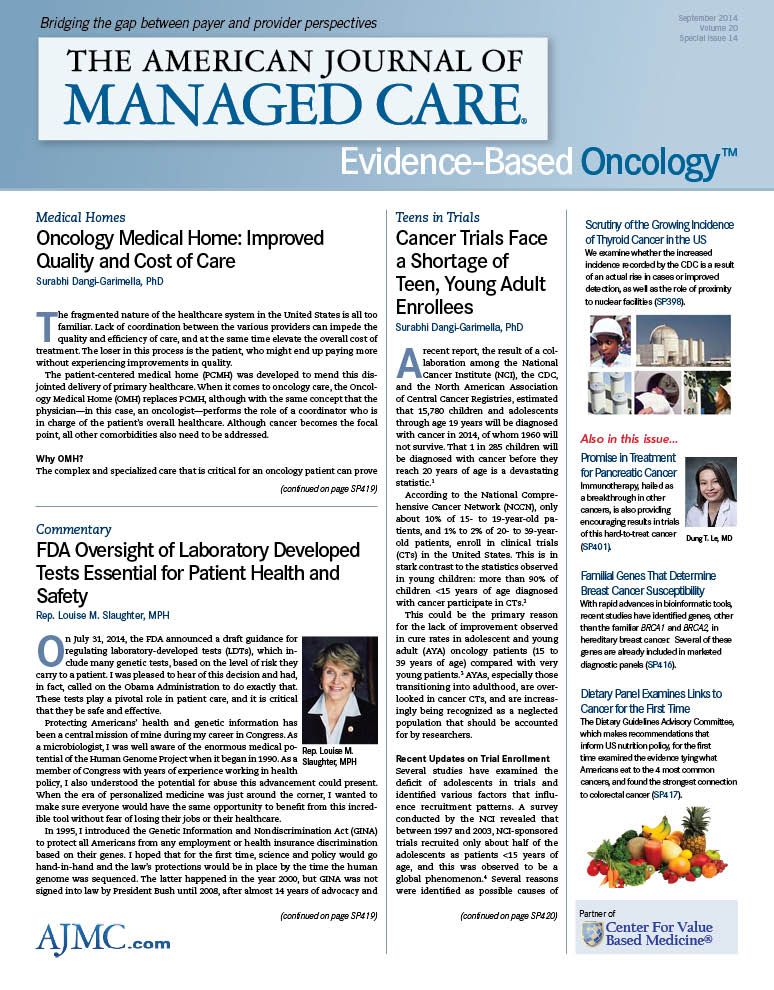- Center on Health Equity & Access
- Clinical
- Health Care Cost
- Health Care Delivery
- Insurance
- Policy
- Technology
- Value-Based Care
Avastin: First Molecule in Nearly a Decade for Metastatic Cervical Cancer
Avastin (bevacizumab), a monoclonal antibody that inhibits the vascular endothelial growth factor and prevents the growth of blood vessels (angiogenesis), has received FDA approval to treat patients with persistent or late-stage cervical cancer.1 The approval allows administration of bevacizumab in combination with paclitaxel and cisplatin or paclitaxel and topotecan in the said population.2
The phase 3 study, conducted in 452 women, met its primary end point of improved overall survival (OS), with a significant 26% reduction in the risk of death when bevacizumab was combined with chemotherapy, compared with chemotherapy alone (median OS:16.8 months vs 12.9 months; hazard ratio = 0.74; P =.0132). Additionally, inclusion of bevacizumab resulted in a higher rate of tumor shrinkage compared with chemotherapy alone.2
Avastin, approved in 2004 as first-line treatment for patients with metastatic colorectal cancer, was the first angiogenesis inhibitor to be granted FDA authorization.3 Richard Pazdur, MD, director of the Office of Hematology and Oncology Products in the FDA’s Center for Drug Evaluation and Research, said, “Avastin is the first drug approved for patients with late-stage cervical cancer since the 2006 approval of topotecan with cisplatin. It is also the first biologic agent approved for patients with late-stage cervical cancer and was approved in less than 4 months under the FDA’s priority review program.”1
EBO
Some of the treatment-related side effects of Avastin include hypertension, thrombosis, and gastrointestinal-vaginal fistulas.2 References
1. FDA approves Avastin to treat patients with aggressive and late-stage cervical cancer [press release]. Silver Spring, MD: FDA; August 14, 2014. http://www.fda.gov/newsevents/newsroom/pressannouncements/ucm410121.htm.
2. FDA approves Genentech’s Avastin plus chemotherapy for treatment of advanced cervical cancer [press release]. South San Francisco, CA: Genentech; August 14, 2014.
http://www.gene.com/media/press-releases/14571/2014-08-14/fda-approves-genentechs-avastin-plus-che.
3. FDA approves first angiogenesis inhibitor to treat colorectal cancer [press release]. Silver Spring, MD: FDA; February 26, 2004. http:// www.fda.gov/newsevents/newsroom/pressannouncements/ 2004/ucm108252.htm.

Quality of Life: The Pending Outcome in Idiopathic Pulmonary Fibrosis
February 6th 2026Because evidence gaps in idiopathic pulmonary fibrosis research hinder demonstration of antifibrotic therapies’ impact on patient quality of life (QOL), integrating validated health-related QOL measures into trials is urgently needed.
Read More
Exploring Racial, Ethnic Disparities in Cancer Care Prior Authorization Decisions
October 24th 2024On this episode of Managed Care Cast, we're talking with the author of a study published in the October 2024 issue of The American Journal of Managed Care® that explored prior authorization decisions in cancer care by race and ethnicity for commercially insured patients.
Listen
Building Trust: Public Priorities for Health Care AI Labeling
January 27th 2026A Michigan-based deliberative study found strong public support for patient-informed artificial intelligence (AI) labeling in health care, emphasizing transparency, privacy, equity, and safety to build trust.
Read More

